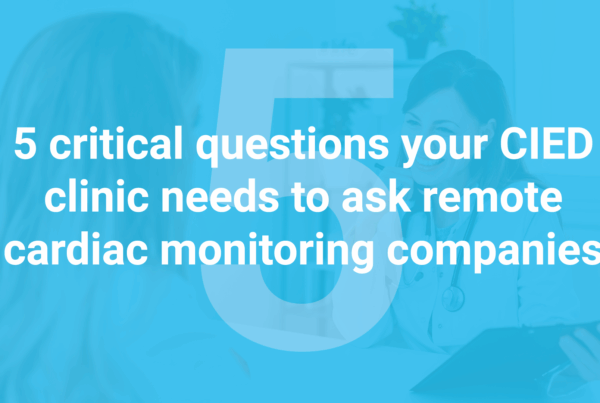In the fast-moving world of cardiac device management, what matters most to electrophysiologists (EPs)? Murj® recently partnered with in2ition on a double-blinded survey of electrophysiologists (EPs) across the US. It offers some interesting insights into how clinics are handling remote monitoring, adopting AI, and leveraging technology.
The verdict? EPs are prioritizing financial efficiency and adopting new tech, but they are wary of tools they can’t fully trust.
Here are three key takeaways you need to know about the current state of cardiac implantable electronic device (CIED) management.
1. A nuanced view on outsourcing remote monitoring
It’s clear that outsourcing the technical component of remote monitoring for CIEDs has become a widely adopted strategy, yet the decision remains a complex one for many clinics.
Clinics have wrestled with the feasibility of managing the entire burden of remote monitoring in-house. Just over half (54 percent) of EPs surveyed reported their clinic outsources the technical component to a third party, while a significant portion continue to manage it internally.
The argument for outsourcing suggests that specialized vendors offer a compelling value proposition, acting as crucial partners in managing technical compliance and an ever-increasing patient load. This perceived value is evident when looking at certain vendors. For example, among EPs familiar with Murj, approximately 70 percent saw the company as having strong capabilities in facilitating CIED clinical workflows.
However, the continued reliance on in-house management by nearly half of EPs suggests that the decision is not a simple “yes” or “no.” Clinics must weigh the benefits of offloading complex technical work against factors like:
- Cost
- Integration challenges with EHR systems
- Loss of direct control over the process
- Data security concerns
The high adoption rate indicates that specialized vendors are a recognized tool, but the substantial number of clinics keeping the work internal shows that for many, the trade-offs of outsourcing still tip the scales toward an in-house solution or a hybrid model. The debate seems to have settled into a realization that neither approach is universally superior, and the best fit depends entirely on the clinic’s unique resources and priorities.
2. Software priorities: Get paid and connect the dots
What defines “must-have” software in the cardiac device clinic? EPs are loud and clear: if the system doesn’t help the bottom line or talk to the EHR, it’s not truly valuable.
When asked about key software attributes, EPs rated two factors highest on top-two box importance (“very important”):
- Ability to facilitate appropriate billing for the device clinic (90 percent)
- Data integration with an EHR (84 percent)
Without reliable billing support and seamless integration into the clinic’s EHR system, advanced features become secondary. The ability to facilitate efficient clinical workflows for the device clinic was also critical, cited as very important by 76 percent of EPs.
3. AI has arrived, but skepticism remains
AI is no longer a futuristic concept—it’s being integrated into daily practice right now. Fifty percent of EP clinics currently incorporate AI tools for dictation. In contrast, only about one-fifth (22 percent) report not using any AI-based tools yet.
When asked where AI could add the most value to CIED patient management, EPs pointed to its ability to prioritize clinical alerts (82 percent), increase the efficiency of remote monitoring (78 percent), and provide early visibility into potential adverse events (78 percent). These are clear signs that clinicians see AI’s greatest potential in solving time-sensitive and data-heavy challenges within the device clinic.
The big AI concern: Can we trust the data?
Despite the excitement, the clinical community remains cautious about AI in clinical decision-making. The overriding concern isn’t cost or ethics; it’s reliability.
The most commonly cited concern about using AI in clinical decision-making was data accuracy and reliability, mentioned by 44 percent of EPs. Other notable concerns included legal/ethical/trust issues (14 percent) and privacy/data protection (14 percent).
For AI to truly revolutionize the CIED clinic, vendors must prioritize demonstrating that their advanced algorithms deliver results that are absolutely reliable and accurate.
About the survey
in2ition, a third-party vendor, conducts a quarterly omnibus online study among 50 EPs in the US. This wave was fielded June 27-July 31, 2025. The research was double-blind. Murj was not identified as the sponsor and did not have access to any identifying information about the respondents.





